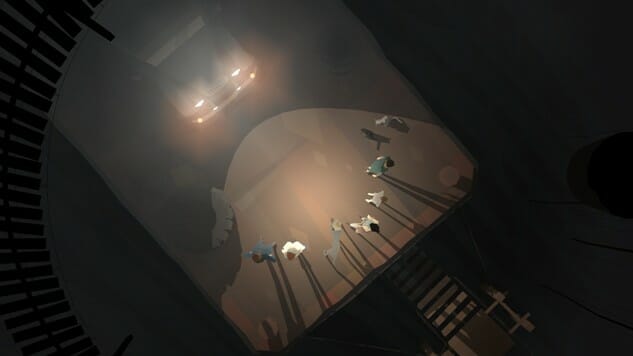
“He’s forgotten more than we’ll ever know,” said a friend of mine reverently about an older mentor of mine.
I agreed, and then wondered quietly what I would forget when I am his age. I thought, forlorn, of all of the words, worlds and people of which I would have only transient knowledge.
The act of playing Kentucky Route Zero has become, over time, as much about patience and anticipation as anything else. While the challenge of other games presents itself through problem-solving or hand-eye coordination, KRZ challenges the player to wait and remember, sometimes for years.
While much of the lengthy delay between Act III and IV can probably be attributed to artistic deliberation on the part of the idiosyncratic and avant garde developers Cardboard Computer, it may be by design that we begin the fourth chapter with only a vague recollection of what has come before. Drifting down a river, our characters in Act IV find themselves in the same existential boat, constantly acknowledging their inability and desire to remember those who have come before.
Unlike previous acts, the player is largely passive this time, this in solidarity with characters we find at sea. They can choose when to stop or start, when to get onboard and when to get off, but they cannot alter its course in any meaningful fashion. They are simply floating downstream, subject to whatever currents are strongest.
Ezra, the young and optimistic child of the bunch, has taken to recording various sounds. I relate to this impulse as a writer dedicated to observation. I take screenshots of the game as I play, which serve much the same purpose: I don’t want to forget this moment, or what it means to me personally, so I grab a shot of a floating gas station, or some guys singing on a boat. But I don’t capture the movement. I don’t capture the song. I don’t capture what happened next, or what lead up to that moment in the first place.
In short: I am unable to capture the meaning. On its own, Ezra’s preoccupation is yet another game, a frivolous way to pass the time. Just like he does with the claw machine he plays later on, he’s grasping at something he can never attain. But what Ezra can do is take those moments and turn them into something else: music.
To play a new chapter of Kentucky Route Zero is to take stock in your life. When I first played KRZ Act I, I was newly married. I’d grown relatively accustomed to life without my father who died more than a year earlier. I had discovered a new career track, one in which I thought I might actually succeed. Like KRZ’s initial protagonist Conway, I was obsessed with progress.
By the time I played Act III, I had striven for far too long. I, like Conway, became a bit more obsessed with the concept of rest, which, of course, I defined as something like: achieving success and feeling satisfied.
Playing Act IV, I find myself admiring the life of those who I now look to for wisdom and guidance. They are older men and women on the cusp of retirement, less concerned about striving than they are about ideas like legacy, continuity and remembrance. Some of the men remind me of my father on a visceral level, which freaks me out, because I can no longer convince myself that I really remember what he was like at all. I wonder sometimes if his memory is literally being replaced.
So now, I relish opportunities to remember him. I keep talking about him for this reason. For this reason I keep a picture of him on a shelf in my house. For this reason I welcome comparisons to him; I feel joy when he is seen in me.
When memories matter more than the striving, you go where the memorials are. You go where you are taken. You go where those who came before wanted you to go in the first place. You make the path your own, but you follow the path. You study the words of those who came beforehand, imbuing meaning to them that may have never existed. You turn workmanlike prose into poetry. You turn found audio into music.
Act IV is a preparation for the end. A little on the nose, I guess. And it’s by far the least spectacular of the bunch. It feels permeated with more realism than the previous three acts. While surreal moments and sardonic, fantastical conversations take place, there are no awe-inspiring or heartstopping moments that inspire reverence. Unlike the previous three acts, the narrative is characterized by a foreboding sense of inevitability followed by the mundane, dull ache of loss.
As we get older, we forget more than we expect, including what will come to feel like the most tangible details of those we most love. We will forget the ones we swore we would keep close to our hearts.
But we will remind others of them through our memorials, whether built, written, or lived.
Kentucky Route Zero: Act IV was developed by Cardboard Computer. It is available for PC, Mac and Linux.
Richard Clark is the managing editor of Christianity Today Online. You can follow him on Twitter.